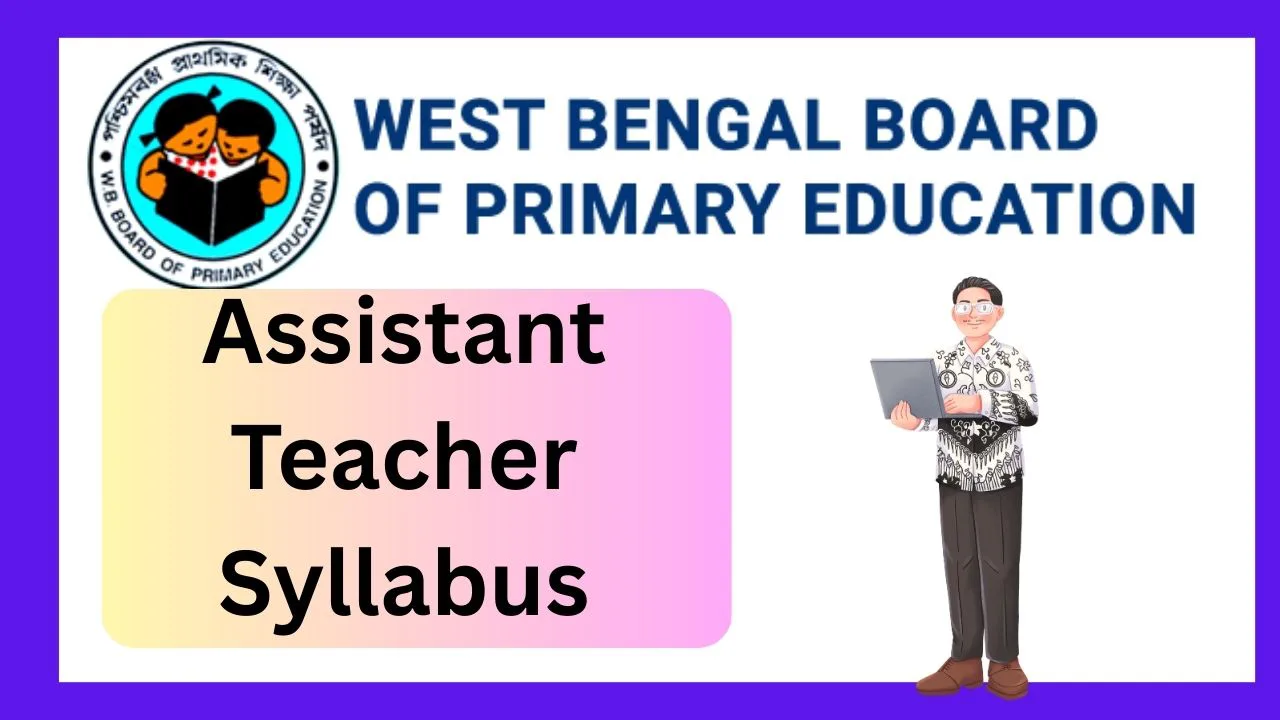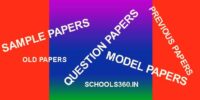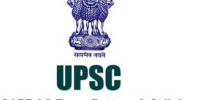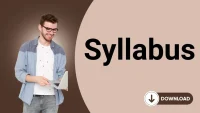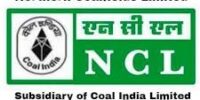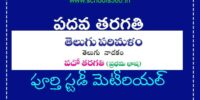The West Bengal Board of Primary Education (WBBPE) is set to conduct the Teacher Eligibility Test (TET) for primary school teachers in 2025. This exam serves as a crucial step for candidates aspiring to teach classes I to V in government schools across West Bengal. Understanding the syllabus and exam pattern is essential for effective preparation.
WB Primary Teacher Syllabus 2025 Overview
| WBBPE Primary Teacher Syllabus 2025 & Exam Pattern PDF Download |
| Name of the Organization | West Bengal Board of Primary Education (WBBPE) |
| Post Name | Primary Teacher |
| Category | Syllabus |
| Location | West Bengal |
| Official Website | wbbpe.org |
WBBPE Assistant Teacher Exam Pattern 2025
In this section, we provide detailed information regarding the WB SSC Exam Pattern 2025. Applicants can determine the number of questions, marks, time duration, and subjects covered in the question paper. This WBBPE Excise Exam Pattern is very helpful for the aspirants who are going to appear in the examination. Review the table below and gather the necessary data.
| Feature | Details |
|---|
| Mode of Exam | Offline (OMR-based) |
| Type of Questions | Multiple Choice Questions (MCQs) |
| Total Questions | 150 |
| Total Marks | 150 |
| Duration | 2 hours 30 minutes |
| Marking Scheme | 1 mark for each correct answer; no negative marking |
| Qualifying Marks | Minimum 60% for General category; relaxation as per government norms for reserved categories |
WBBPE Primary Teacher 2025 Exam Pattern Paper-I
The exam is divided into five sections, each contributing 30 questions:
| S.No. | Subjects | No. of Questions | Marks |
| 1 | Child Development and Pedagogy | 30 | 30 |
| 2 | Language I (compulsory) | 30 | 30 |
| 3 | Language II (compulsory) | 30 | 30 |
| 4 | Mathematics | 30 | 30 |
| 5 | Environmental Studies | 30 | 30 |
| | Total | 150 | 150 |
WBBPE Primary Teacher Syllabus 2025
Part 1: Child Development and Pedagogy (30 MCQs) | CHILD DEVELOPMENT & LEARNING - Concept of development and its relationship with learning
- Principles of the development of children
- Influence on Heredity & Environment
- Socialization processes: Social world & children (Teacher, Parents, Peers)
- Piaget, Kohlberg and Vygotsky: constructs and critical perspectives
- Concepts of child-centred and progressive education
- Critical perspective of the construct of Intelligence
- Multi-Dimensional Intelligence
- Language & Thought
- Gender as a social construct; gender roles, gender-bias and educational practice
- Individual differences among learners, understanding differences based on diversity of language, caste, gender, community, religion etc
- The distinction between Assessment for learning and assessment of learning; School-Based Assessment, Continuous & Comprehensive Evaluation: perspective and practice
- Formulating appropriate questions for assessing the readiness levels of learners; enhancing learning and critical thinking in the classroom and assessing learner achievement.
- CONCEPTS OF INCLUSIVE EDUCATION AND UNDERSTANDING CHILDREN WITH SPECIAL NEEDS:
- Concept of exceptional children and children with special needs (CWSN).
- Addressing learners from diverse backgrounds including disadvantaged and deprived.
- Addressing the needs of children with learning difficulties, ‘impairment’ etc.
- Addressing the Talented, Creative, Specially abled Learners.
LEARNING AND PEDAGOGY: - Alternative concepts of learning in children
- Cognition and emotions
- Motivation and learning
- Classroom management
- Punishment and its legal implications, rights of a child.
- Guidance and counselling: concept, nature and types.
- How children think and learn; how and why children ‘fail’ to achieve success in school performance.
- Basic processes of teaching and learning;
- Children’s strategies of learning; learning as a social activity; social context of learning.
- Child as a problem solver and a ‘scientific investigator’
- Alternative conceptions of learning in children, understanding children’s ‘errors’ as significant steps in the learning process.
- Cognition & Emotions.
- Motivation and learning.
- Factors contributing to learning – personal & environmental.
|
Part 2: Language 1: Critical English (30 MCQs) | LANGUAGE COMPREHENSION - Two passages, one from prose and the other from poetry with questions on comprehension, inference, grammar and test of vocabulary.
- Determiners
- Subject-verb
- Concord
- Interrogatives
- Framing Yes/No & ‘WH’ questions
- Question tags
- Prepositions
- Tense and time
- Phrasal verbs
- Gerunds & Participle
- Auxiliary verbs
PEDAGOGY FOR LANGUAGE DEVELOPMENT: - Challenges of teaching language in diverse classrooms: language difficulties, errors and disorders.
- Introduction to English Phonology: vowels and consonants, syllable division.
- Evaluating language comprehension and proficiency in LSRW (Listening, Speaking, Reading and Writing).
- Teaching-learning materials.
- Strategies for teaching children with special needs (CWSN).
- Remedial teaching.
- Learning and acquisition.
- Principles of Language Teaching.
- Role of listening and speaking; function of language and how children use it as a tool.
- A critical perspective on the role of grammar in learning a language for communicating ideas verbally and in written form.
- Challenges of teaching language in a diverse classroom; language difficulties, errors and disorders.
- Language Skills.
- Evaluating language comprehension and proficiency: speaking, listening, reading and writing.
- Teaching-learning materials: Textbook, multimedia materials, multilingual resources of the classroom.
|
Part 3: Language 2: Bengali (30 MCQs) | LANGUAGE COMPREHENSION Two unseen prose passages (discursive or literary or narrative or scientific) with questions on comprehension, grammar and verbal ability. - Challenges of teaching language in diverse classrooms: language difficulties, errors and disorders.
- Introduction to English Phonology: vowels and consonants, syllable division.
PEDAGOGY - Evaluating language comprehension and proficiency in LSRW (Listening, Speaking, Reading and Writing).
- Teaching-learning materials.
- Strategies for teaching children with special needs (CWSN).
- Remedial teaching.
- Learning and acquisition.
- Principles of language Teaching.
- Role of listening and speaking; function of language and how children use it as a tool.
- A critical perspective on the role of grammar in learning a language for communicating ideas verbally and in written form.
- Challenges of teaching language in a diverse classroom; language difficulties, errors and disorders.
- Language Skills.
- Evaluating language comprehension and proficiency: speaking, listening, reading and writing.
- Teaching-learning materials: Tex
|
Part 4: Mathematics (30 MCQs) | CONTENT - Geometry
- Shapes, spatial understanding, solids, the perimeter of rectilinear figures, area of rectangles, practical problems, surface area and volume of solids (sphere, cube, rectangular, parallelepiped), practical problems.
- Measurement
- Numbers
- Arithmetic
- Fractions
- Weight
- Time
- Data handling
- Patterns
- Money
PEDAGOGICAL ISSUES IN MATHEMATICS - Language of Mathematics
- Community Mathematics
- Nature of mathematics
- Methods of teaching mathematics
- Instructional material in mathematics
- Evaluation, the concept of continuous and comprehensive evaluation. Problems in teaching mathematics
- Error analysis and related aspects of learning and teaching.
- Diagnostic and remedial teaching.
Part 5: Environmental Studies (30 MCQs)KNOWLEDGE OF EVS - Concept and scope of environmental studies
- Significance of environmental studies.
- Integrated approach in environmental studies.
- Scope and relation of environmental studies to science and social science.
- Approaches of presenting concepts.
- Environmental studies and environmental education.
- Learning principles.
- Activities.
- Discussion.
- Health and Hygiene
- Shelters: Types of shelters, characteristics of animal shelters.
- Types of vehicles used, railways, waterways and airways.
- Water: Types of water resources, conservation of water resources, water pollution, cause and prevention of water pollution, the impact of water pollution on the environment, flood and drought.
- Composition of air, causes and impact of air pollution on the environment, greenhouse effect and global warming.
- Different types of soil, soil erosion, the impact of soil pollution and its prevention.
PEDAGOGICAL ISSUES - Concept and scope of EVS.
- Significance of EVS and integrated EVS.
- Environmental Studies & Environmental Education.
- Learning Principles.
- Scope & relation to Science & Social Science.
- Approaches of presenting concepts.
- Activities.
|
WBBPE Primary Teacher Syllabus 2025 (PDF) Download

